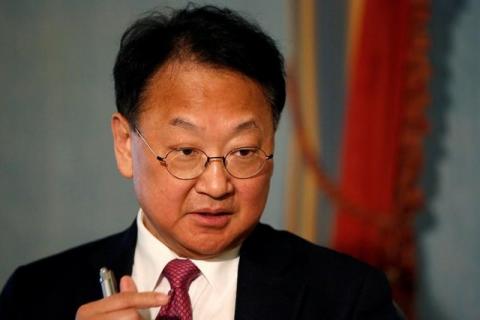Advertisement
South Korea finmin: No firm evidence of China retaliation in missile spat
SEJONG, South Korea (Reuters) - South Korea does not have firm evidence that China has retaliated for Seoul's deployment of a U.S. missile defense system, so no action has been taken against Beijing, South Korea's finance minister said on Monday.
China has increased pressure on companies doing business with and in South Korea, largely perceived as retaliation over the deployment of the Terminal High Altitude Area Defense (THAAD) missile system.
While China has publicly opposed last week's THAAD deployment, Beijing has not directly said it was targeting South Korean firms in retaliation.
"If we want to take this into court, we have to have evidence. But we don't have that yet, so we cannot take action," Finance Minister Yoo Il-ho told reporters at his ministry.
"It's not as if we are standing still with the evidence in hand."
When asked what would be determined as hard evidence, Yoo declined to answer the question, only saying a ruling cannot be made on conviction alone.
"Without a definitive link between these actions (and THAAD), filing a lawsuit or any of that could be difficult," the minister said.
Yoo said the government was aware of the "emotional troubles" at the moment, and Seoul was trying to help companies affected by the situation.
Seoul has offered cheap loans and deadline extensions for debt repayments to small to medium-sized South Korean businesses hit by a decline in Chinese tourism, a joint statement from South Korean financial authorities said on Sunday.
Yoo said the government was trying to arrange a meeting with his Chinese counterpart at this weekend's Group of 20 finance ministers' meeting in Germany, but nothing has been fixed yet. He added Seoul would "confidently" take action against China if need be.
China opposes the THAAD deployment because it is worried the system's powerful radar could penetrate its territory.
Meanwhile, South Korea's financial markets were maintaining steady trade flows after Friday's ouster of President Park Geun-hye, although economic uncertainties unrelated to the political scandal remain, Yoo added.
One of those risks is the U.S. Federal Reserve policy meeting this week, where interest rates are strongly expected to be raised, the minister said.
Yoo said a change in U.S. monetary policy could directly affect household debt in South Korea, which the government will try to continue managing.
(Reporting by Shin-hyung Lee and Christine Kim; Editing by Richard Borsuk and Randy Fabi)



















Add new comment